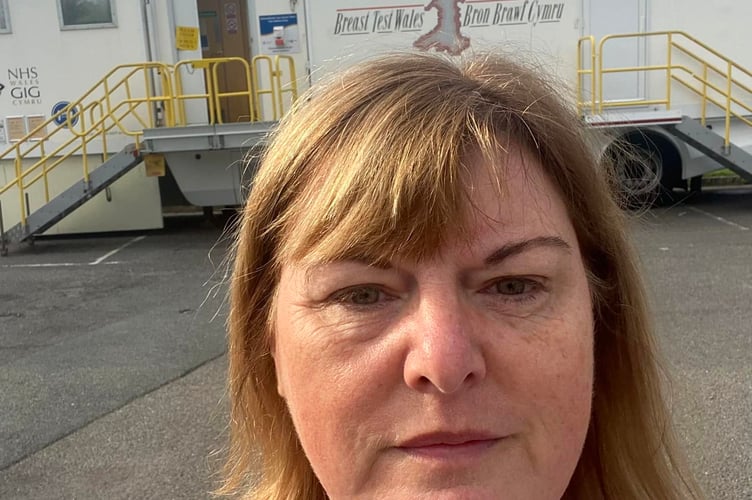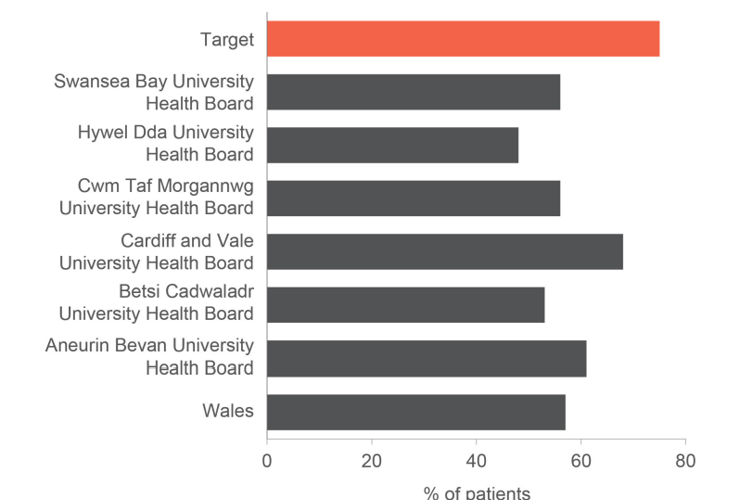Last week Audit Wales published a damning report that confirmed what many already knew – that NHS Wales is failing its cancer patients.
No single Welsh health board has met the government target since 2020, to get 75 per cent of cancer patients starting treatment within 62 days of the cancer first being suspected.
In response, a huge cross-party backlash occurred calling for a change of government, a change in approach and more funding.
But with a 54 per cent increase in real-term spending for cancer services over the last 13 years, throwing money at the problem isn’t working.
So this week the Cambrian News asks, is the Senedd ‘in denial’ about its cancer treatment wait times?
To put the 62-day target into perspective – from the moment a patient is told they may have cancer, the government is aiming for that person to start treatment for said cancer in roughly two months or less.
Patients having been through that process tell us this wait is excruciating, from waiting for a scan to waiting for results, to waiting for a treatment plan and to start it – they say it makes the whole experience of having cancer even worse.
Patients say their lives have been put “on hold” whilst enduring this “agonising wait” for cancer treatment.
The Audit Wales report states that between 39-47 per cent of patients are missing that target, with some cancers facing even more severe wait times of 100 days and above.
Now, wait times have become so bad that patients no longer want to speak out in case it impacts their chances of being treated faster.
One patient who has continued to speak out against these appalling wait times is breast cancer survivor Julie Grabham from Lampeter.

Julie’s cancer was detected in a routine breast screening appointment – something she is now campaigning to make more accessible by lobbying businesses to offer paid leave for scans.
From that fateful appointment in 2022, Julie waited over 100 days, more than three months, for her treatment to begin.
She said: “I didn’t just get breast cancer, I got anxiety.
“You’re out of control of your life.
“Trying to find out when my lumpectomy was like getting blood out of a stone.”
The proud grandmother of four and successful businesswoman is now supporting other people going through long waits via the support group CHILL (Cancer Help In Local Lives).
Julie, 56, responding to the report, said: “From my personal experience and listening to others at CHILL, I know living with cancer is all-consuming, mentally, physically and financially.
“As Caroline Griffiths from CHILL says, ‘living with cancer is a full-time job’.
“The ongoing stress of waiting for appointments sometimes overshadows the diagnosis – all this can be improved with more funding, better distribution of funds and improved systems.
“Unfortunately, there is a huge disparity in waiting times for scans and tests between different hospitals, even those within the same trust.
“For example, a mammogram carried out in Llanelli can mean results the same day, yet in Singleton, you could wait weeks - that simply is not acceptable.
“We also know that employers can do more to support those living with cancer.

“I’m pleased that my multi-award-winning workplace cancer campaign, the JGHRPledge, already has 150 businesses making a difference to thousands of employees.
“If I as an individual living with cancer can make such a huge difference, surely the Welsh government and NHS can do too.”
What the Audit Wales report says
Though it’s common knowledge that the NHS has struggled with its wait lists since the Covid-19 pandemic and before, it’s worth noting that cancer is currently the leading cause of death in Wales.
The country also has the second highest cancer mortality rate in the UK, and the UK itself is doing poorly compared to other countries.
Though cancer rates are going up everywhere, Wales has an ageing population and with it, higher rates of long-term sickness, so the strain on Welsh services is heavier than other countries.
The report underlines that early diagnosis and timely treatment are “key to survival for most cancers” - two things this wait time target aims to address.
However patients diagnosed with gall bladder, pancreas and lung cancer in Wales aren’t being identified quickly enough.
The report found that patients with these cancers were more likely than other cancer patients to be diagnosed at stage four – meaning their cancer is not being spotted earlier and as a result their cancer is getting more difficult to recover from.
The report concludes: “Overall, we found that despite increased investment, there is a continuing failure to meet the national performance targets for cancer with a minority of patients facing unacceptably long waits for diagnosis and/ or treatment.
“Cancer outcomes in Wales have improved over recent years but are still poor compared to other countries.
“Stronger and clearer national leadership is urgently needed to help drive the necessary improvements in the timeliness and sustainability of cancer diagnosis and treatment.”
Crucially, the report stated that the demand for cancer diagnoses is increasing faster than NHS Wales’ ability to meet that demand.
Terrifyingly, the report is littered with the word “confused” in relation to the direction of the government’s various cancer wait time improvement plans and it’s data, as an example stating: “NHS and third sector bodies are confused about the Cancer Improvement Plan’s status and what, if anything, they should be doing to implement it.”
It adds that the government hasn’t set out a “coherent policy framework” for cancer prevention, despite 38 per cent of the cancers the NHS is seeing being classed as “preventable”.
The report also called out “inaccuracies” in the national tracking data for cancer wait times, calling the work to improve the outdated information “slow”.
One thing Labour, the Conservatives, Plaid Cymru, NHS Wales executive and Macmillan Cancer Support all seem to agree on is this – the current plan is not working.
Macmillan’s Head of External Affairs Kate Seymour said: “This crucial report from Audit Wales clearly shows the failure of the Welsh government to tackle the crisis in cancer waiting times.
“Their analysis demonstrates a lack of strong national leadership is impacting on waiting times and Wales should be doing better.
“The report concludes that without urgent action, the Welsh government is unlikely to achieve its more ambitious waiting times target of 80 per cent by 2026.
“As recommended by the report, the Welsh government must urgently implement the Cancer Improvement Plan and be clear on how they will ensure accountability for delivery.
“The most recent set of cancer waiting times figures for Wales found little sign of improvement, with 2024 on track to show the national target for cancer waiting times performance will be missed once again.
“We must not forget there are real people facing agonising delays and worrying about whether they have cancer or when their treatment is going to start.
“People in Wales with cancer deserve better.”
In response to the report, a Welsh Government spokesperson stated it was already looking into a change of strategy: “We welcome the findings from the Audit Wales report and are committed to improving cancer services in Wales.
“We are absolutely focused on working with the NHS to improve access to diagnosis and treatment as part of our target for 75 per cent of those diagnosed to begin treatment within 62 days of when their cancer is first suspected.
“We are also revising our national cancer leadership arrangements to provide a clearer and stronger direction for cancer improvement.”
Welsh Conservatives including shadow secretary for health and social care James Evans MS however argued that “only through a change in government” will improvements be made: “Under Labour, barely half of Welsh cancer patients are receiving treatment within the target time. That cannot continue.
“Audit Wales is clear, throwing money at the problem will achieve nothing.
“Only through a change in government will we see the ‘stronger and clearer national leadership’ required to drive through the improvements that we need to see for patients.”
The Audit Wales report is made all the more damning by another report published in November by Plaid shadow health secretary Mabon ap Gwynfor, stating very similar things about NHS management, calling out a culture problem of micromanagement by government ministers.
The 16-page report looked into accountability, performance and culture across the seven major health boards.
After interviewing 30 executive-level workers in or with the NHS, the common issues raised included; a lack of realism in matching ambition with resources, lack of coherence and detail in delivery plans, overly complex organisational structures, insufficient resourcing of oversight structures, lack of consistent performance measurements, patients voices being insufficiently championed, a poor complaints procedure, the normalisation of poor standards in certain areas, and a culture of frustration stemming from insufficient progress in problem-solving, a high level of ministerial involvement and a ‘yes culture’ to ministerial instruction despite the instructions being “unachievable”.
Facing the Labour health secretary Jeremy Miles MS in Senedd on 15 January, ap Gwynfor urged him to back Plaid’s proposed reforms to NHS governance, to which Mr Miles said: “I was very pleased to see the kind of fresh thinking I was seeking to bring to the challenges which we face was agreed to by Plaid Cymru.
“And I see the same thing in the plan that was published … yesterday in relation to tackling waiting lists.”
However ap Gwynfor described this comment as a “complete denial of the problems in the health service”.
His report concluded that “failure to resolve the governance-related issues is destined to generate increasingly diminished returns from any future spending decisions”, including when it comes to recruiting staff.
If Wales is funding recruitment drives, where are all the oncologists?
It’s common knowledge that the NHS is understaffed.
This has gotten worse since the pandemic – with oncology and radiology staff retiring earlier, changing professions and working less hours than ever before.
In Wales there are significant vacancies in radiology and oncology staff – the people who do the scans, analyse whether the scans show cancer or not, and then set up a treatment programme.
Audit Wales outlined the fact that the extra money the government has assigned to cancer care over the year also doesn’t translate necessarily to extra resources, instead in some cases feeding the cost of inflation, new drugs and treatments and paying agencies due to lack of NHS staff.
Though the government is addressing the staff shortages through recruitment programmes such as the £3.4m investment in a National Imaging Academy to grow radiologist numbers, some NHS bodies haven’t been able to create the jobs to pay these newly trained people.
This is something James Evans MS, grilled health secretary Jeremy Miles on in the Senedd last week, pointing to workforce planning failures, severe staff shortages, over-reliance on agencies and recruitment and retention problems.
Evans said: “These staff shortages are directly delaying cancer diagnosis and treatment, worsening outcomes for patients.
“Despite repeated warnings from organisations like the Wales Cancer Alliance, the Welsh Government has failed to deliver a comprehensive workforce strategy.
“There is becoming an outrage in the public about the ballooning number of managers across the NHS compared to frontline health care providers.
“Shockingly, administrative and estate staff have increased by 51 per cent in that time.
“After 26 years, how can the Labour Welsh Government justify the bloated expansion of administrative roles while patients face unacceptable delays for treatment due to a lack of frontline staff?”
Mr Miles rebuffed: “The member makes an easy point, and a populist point, but the truth is a complex healthcare system requires people who are competent….
“There has been an increase in recruitment to the NHS across all disciplines and all-important roles which enable the NHS to be effectively run.
“A world view which suggests that managers and those running the NHS simply should be taken out of the system, I think, is a very naive perspective.”



